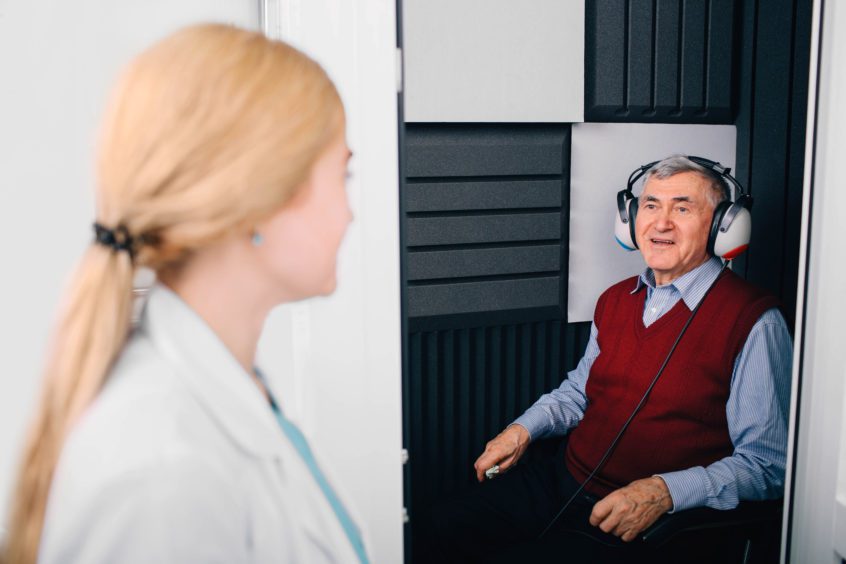According to researchers from Johns Hopkins Medicine in Baltimore, in 2020, 55 percent of adults with hearing loss are 70 or older. In just 40 years, by 2060, that rate will jump to 67 percent. The researchers projected future hearing loss using data from the U.S. National Health and Nutrition Examination Survey.
Clearly, hearing loss is a common problem in the United States. It affects more people than diabetes or cancer, and can have a huge impact on an individual’s quality of life.
Often, hearing loss begins slowly and progresses. Because the loss can be so gradual, it can sometimes be difficult for the individual to detect. Here are some signs that you might have a hearing loss:
- It sounds like people are mumbling.
- You have trouble distinguishing consonants, like f, t, or s.
- You have the TV or radio volume turned up significantly.
- You often have to ask people to repeat themselves.
- You have difficulty hearing people when background noise is present, like in restaurants or at social gatherings.
- You stop interacting with others and withdraw from activities you would normally take part in.
You also may not enjoy activities you once did, like listening to music or listening to the birds while on a walk in the woods. Hearing loss can mute all of the everyday sounds that you enjoy.
Plus, hearing loss can compromise your safety, making it difficult to hear a fire alarm beeping or a car horn honking at an intersection, for example.
From a health perspective, several studies have now connected untreated hearing loss to cognitive decline and brain health, plus it’s linked with higher risk of depression and anxiety.
But what can you do about hearing loss?
If you think you have hearing loss, the first step is to have a comprehensive hearing evaluation performed by a doctoral-level audiologist. Please note, this is NOT a screening. A screening just takes a few minutes and gives you an idea if you may have a hearing loss, but it’s just a simple way to see if hearing loss may be present. Hearing aids should never be prescribed or fit based on the results of a screening or partial test.
A comprehensive hearing evaluation, on the other hand, typically takes 60 to 90 minutes to conduct. During this time, the audiologist will take your case history. This includes talking about your medical history and the hearing problems you have. This also allows time to understand your challenges, establish your goals, discuss recommendations, and review what to expect.
The audiologist will look into your ears using a light, called an otoscope. This is to check if there is anything in your ear that will make it hard to test your hearing.
The audiologist will then do different tests, usually in a sound treated booth. These tests include:
Pure Tone Testing
If you’ve ever had your hearing tested in school or at the doctor’s office, you might remember putting earphones on and raising your hand whenever you heard the “beep.” This is pure-tone testing. It is also called air conduction testing since the sounds go through your outer and middle ear. This test helps find the quietest sound you can hear at different pitches, or frequencies. Having earphones on lets the sounds go to one ear at a time.
Speech Testing
The audiologist will say words to you through headphones, and you will repeat the words. The audiologist will record the softest speech you can repeat. You may also need to repeat words that you hear at a louder level. This is done to test word recognition or measure word understanding.
Tympanometry
Tympanometry tests how well your eardrum moves. The audiologist will put a small probe into each ear. A small device attached to the probe will gently push air into your ear. The person testing you will see a graph on the device, called a tympanogram. All you have to do is sit quietly.
The shape of the graph tells the audiologist about how your eardrum moves. It will show if your eardrum moves the correct way, is too stiff, moves too much, or has a hole in it. This can help the audiologist refer if you have middle ear fluid, or a hole in the eardrum.
Additional testing, or a referral to a physician may be necessary depending on what the testing finds.
In most cases, the audiologist will review the test results with you immediately, and will let you know if you have a hearing loss or not. If you have hearing loss, the audiologist may discuss hearing aids with you. If you do not, the audiologist may recommend hearing testing at regular intervals to monitor hearing health on an ongoing basis. In other cases, medical referral is necessary.
Schedule a comprehensive hearing evaluation with a doctoral-level audiologist.



